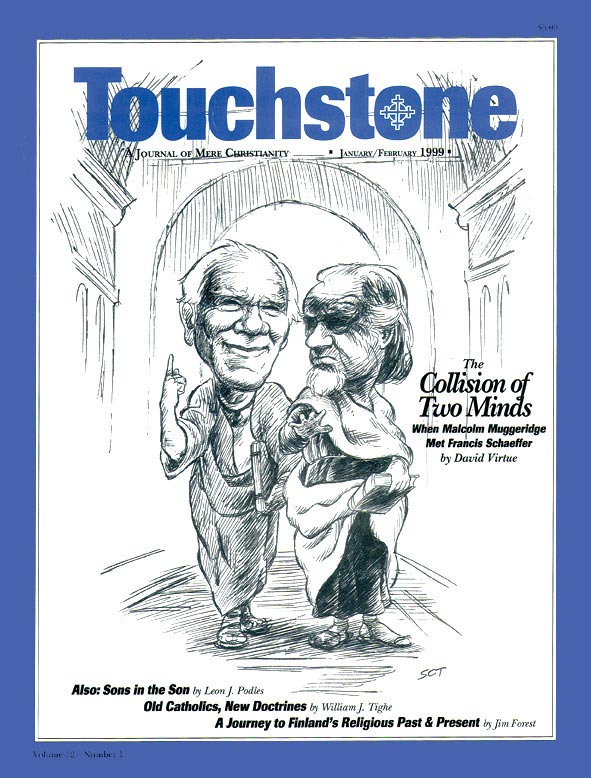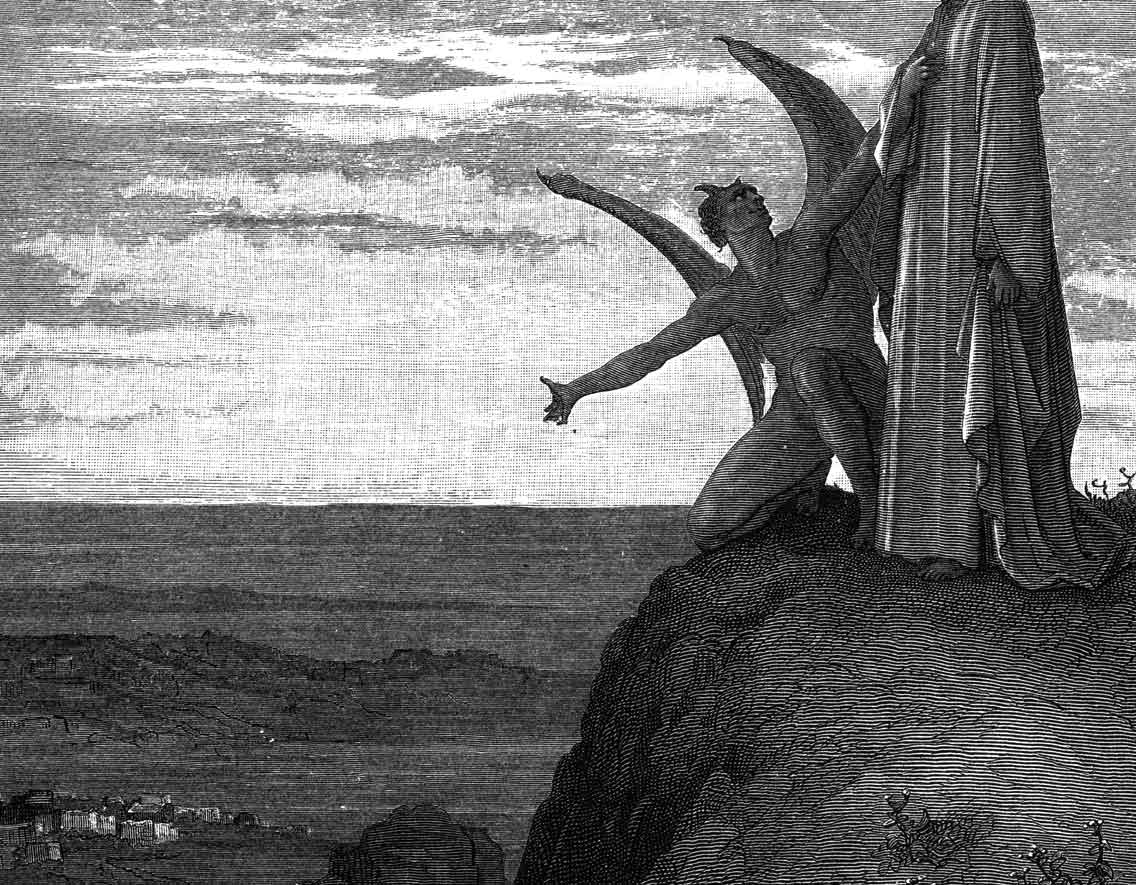The Sword & the Scalpel
by David Mills, for the Editors
In the last year or so, the Methodists and Presbyterians have rejected homosexuality, while the Lutherans turned down intercommunion with the Episcopalians. The Episcopalians insist that every member accept women’s ordination, while by an almost eight-to-one majority the world’s Anglican bishops declared homosexuality “incompatible with Scripture.”
So the governing bodies of the mainline Churches seem to be moving, finally, after decades of “struggle” and “dialogue” and “living in tension” and “exploration” and “openness,” toward doctrinal clarity. They move slowly, of course, because they always move slowly, and they move partially and inconsistently (the Lutherans approved intercommunion with the United Church of Christ, while the Episcopalians decided to keep studying homosexual marriages), but on at least some questions they seem newly willing to say “Thus saith the Lord.”
On these questions they do not speak with that studied ambiguity through which the mainline Churches have managed for thirty or more years to avoid definite decisions for or against their traditions. They managed to so confuse every question as to affirm their traditional teaching while discreetly signaling their tolerance of innovations therein. They want either to be “big tents” in which the widest diversity is “celebrated” or to “affirm the traditional teaching” while “recognizing the discontinuities” in some members’ experience.
In doing this so well they have kept their Churches from dividing over doctrinal differences. The costs of doing so were well hidden: the loss of members, not only those who left but also those who did not join, the inability to know what they ought to do and the loss of energy to do it, and the inability to speak the Word with confidence and clarity.
A Slow Process
Partially, incompletely, intuitively, many in the Churches have begun to find confusion intolerable. But the process of clarifying their teaching is a slow one, because so many of their leaders have invested so deeply in diversity and confusion.
Some prefer the tradition of doctrinal confusion because it provides a cover beneath which they can advance their own causes. In the Episcopal Church, the party of pluralism has turned into the party of purity when they have the political power to enforce their will (demanding that everyone accept the ordination of women) and remaining the party of pluralism when they cannot (pleading for “study” of homosexual marriages).
In both cases, they congratulate themselves on their exceptional virtue in holding the position they do: for their prophetic courage and pastoral sensitivity in demanding conformity, and for their pastoral sensitivity and prophetic courage in demanding continued openness and exploration. It is difficult to interrupt the self-congratulation long enough to tell them that one assertion contradicts the other.
Some on both sides prefer confusion to clarity because clarity will upset the arrangements in which they are comfortable. A limited doctrinal confusion helps those with a place in the Church’s system live in comfort with those they radically oppose.
One conservative Episcopalian, the director of an activist organization, cheerily announced after the election of Frank Griswold as presiding (or chief) bishop that Griswold—a man who ordains not only women but also unrepentant homosexuals and who promotes feminist language for God—is “a liberal revisionist” but that “the first word is more characteristic of him than the latter.” Put this into a biblical parallel: “Ahab is a liberal Ba’al-worshipper, but the first term is more characteristic of him than the second.”
The question, surely, is what Bishop Griswold believes, and in what relation this conservative leader should be with a man who believes what Bishop Griswold does. A man may be genial and kind and open-minded, and still say what a Christian may not say and do what a Christian may not do. He might, for example, sign a public statement asserting the godliness of homosexuality (the Koinonia Statement written by Bishop John Spong), in opposition to the first chapter of Romans, and he may speak of God as mother in opposition to the Scriptures.
And some are still confused about the nature of the truth. They cannot see that a thing cannot be itself and its opposite, that, for example, a Church cannot say that Jesus is “the only begotten Son of God” and also say in interfaith dialogue that he is but one way to the Divine.
An Odd Similarity
The Church leaders who have pressed for doctrinal clarity have not, I think, yet understood the cost of speaking so clearly on divisive questions. Christians find their unity first and fundamentally in the truth, and in their Churches only as those express the truth. If they are not one in the truth, they are not one in any usefully Christian sense, even if they are members of the same Church.
Two men may be Presbyterians in good standing and yet in religion be more deeply sundered than a Christian is from a Hindu. Two Episcopalians may agree on the importance of Apostolic Succession when one believes that it originated with the Son of God and the other that it originated with a first-century religious genius about whom very little can today be known. Two Lutherans may disagree on the Fatherhood of God while claiming equal belief in justification by faith.
The Truth himself said, “I came to bring not peace but a sword.” Swords serve their purpose by dividing, by cutting in two something that was once whole. They hurt what they cut. We do not like suffering such pain, and most of us (most of the time) do not like inflicting such pain. But pain is the cost of believing that the truth matters. One cannot temporize or compromise or confuse the issues forever, because compromise harms human souls and bodies.
The issue in which this is most glaringly clear is the godliness or ungodliness of homosexual practice. The Churches have continually offered to “listen” to the homosexual man as he shares his experience while weakly reaffirming their historic teaching. But the homosexual doesn’t only or primarily want to be listened to, he wants the Church to marry him to his boyfriend.
To homosexual people, the Churches must give a word of warning or a word of liberation, but they must not act as if the truth might be one or the other, depending on who their bishop or pastor is, so that what is godly in Chicago is ungodly in Peoria. That is to play cruelly with peoples’ lives. But to say a definite word of warning or of liberation will divide the Church that says it.
The Churches must make their doctrine clearer and clearer, even if this means, as it certainly will, that they wield the sword on themselves. Then they will find, or rather the believers in them will find, that the sword is a scalpel, wielded as by a surgeon for their healing.
David Mills has been editor of Touchstone and executive editor of First Things.
subscription options
Order
Print/Online Subscription

Get six issues (one year) of Touchstone PLUS full online access including pdf downloads for only $39.95. That's only $3.34 per month!
Order
Online Only
Subscription

Get a one-year full-access subscription to the Touchstone online archives for only $19.95. That's only $1.66 per month!
bulk subscriptions
Order Touchstone subscriptions in bulk and save $10 per sub! Each subscription includes 6 issues of Touchstone plus full online access to touchstonemag.com—including archives, videos, and pdf downloads of recent issues for only $29.95 each! Great for churches or study groups.
Transactions will be processed on a secure server.
more from the online archives
calling all readers
Please Donate
"There are magazines worth reading but few worth saving . . . Touchstone is just such a magazine."
—Alice von Hildebrand
"Here we do not concede one square millimeter of territory to falsehood, folly, contemporary sentimentality, or fashion. We speak the truth, and let God be our judge. . . . Touchstone is the one committedly Christian conservative journal."
—Anthony Esolen, Touchstone senior editor









